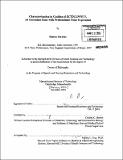Characterization in cochlea of KCTD12/PFET1, an intronless gene with predominant fetal expression
Author(s)
Kuo, Sharon Fan
DownloadFull printable version (11.51Mb)
Other Contributors
Harvard University--MIT Division of Health Sciences and Technology.
Advisor
Cynthia C. Morton.
Terms of use
Metadata
Show full item recordAbstract
The prevalence of severe to profound bilateral congenital hearing loss is estimated at 1 in 1000 births, at least half of which can be attributed to a genetic cause. To date, mutations in at least 67 genes have been associated with hearing loss. Discovery of these genes has revealed fundamental processes within the ear, and enabled diagnosis and implementation of genetic counseling in affected patients. As a part of the continuing effort to study genes important for hearing and deafness, a novel cochlear transcript with predominantly fetal expression containing a single tetramerization domain (PFET1, HUGO-approved symbol KCTD]2) was identified from the Morton fetal cochlear cDNA library. KCTD12/Kctd]2 is an evolutionarily conserved intronless gene encoding a 6 kb transcript in human and three transcripts of approximately 4, 4.5 and 6 kb in mouse. The protein, pfetin, is predicted to contain a voltage-gated potassium channel tetramerization (T1) domain. This thesis reports characterization of this novel human gene and its encoded protein pfetin in relation to its role in auditory function. Experimental data from tissue and cellular expression profiling, and genetic and functional analyses suggests KCTD12 and its orthologs playing a crucial role in the developmental of the auditory sense organ.
Description
Thesis (Ph. D.)--Harvard-MIT Division of Health Sciences and Technology, February 2006. "December 2005." Includes bibliographical references.
Date issued
2006Department
Harvard University--MIT Division of Health Sciences and TechnologyPublisher
Massachusetts Institute of Technology
Keywords
Harvard University--MIT Division of Health Sciences and Technology.